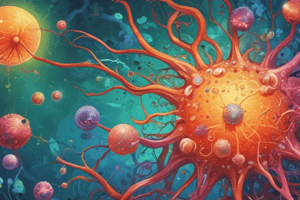Podcast
Questions and Answers
Which of the following is a primary lymphoid organ?
Which of the following is a primary lymphoid organ?
- Lymph node
- Spleen
- Thymus (correct)
- Peyer's patches
Which antibody isotype is most effective at activating the classical complement pathway?
Which antibody isotype is most effective at activating the classical complement pathway?
- IgA
- IgM (correct)
- IgE
- IgG
What is the main function of MHC Class I molecules?
What is the main function of MHC Class I molecules?
- Present intracellular antigens to CD8+ T cells (correct)
- Activate B cells
- Present extracellular antigens to CD4+ T cells
- Trigger histamine release
Which cytokine is critical for the activation of macrophages in a TH1 response?
Which cytokine is critical for the activation of macrophages in a TH1 response?
What is the function of the membrane attack complex (MAC)?
What is the function of the membrane attack complex (MAC)?
Type I hypersensitivity involves which immune component?
Type I hypersensitivity involves which immune component?
Which T cell subset is involved in allergy and parasitic infections?
Which T cell subset is involved in allergy and parasitic infections?
Which complement protein is the first to be activated in the alternative pathway?
Which complement protein is the first to be activated in the alternative pathway?
What do CD8+ T cells recognize on target cells?
What do CD8+ T cells recognize on target cells?
What type of hypersensitivity is mediated by immune complexes?
What type of hypersensitivity is mediated by immune complexes?
What does the hygiene hypothesis suggest about exposure to pathogens?
What does the hygiene hypothesis suggest about exposure to pathogens?
What is the function of Properdin in the alternative pathway?
What is the function of Properdin in the alternative pathway?
Which cell type is primarily responsible for producing histamine during inflammation?
Which cell type is primarily responsible for producing histamine during inflammation?
What is the primary role of T regulatory (TREG) cells?
What is the primary role of T regulatory (TREG) cells?
Which cytokine is essential for the differentiation of TH17 cells?
Which cytokine is essential for the differentiation of TH17 cells?
What is the primary function of acute phase proteins?
What is the primary function of acute phase proteins?
Flashcards
Thymus
Thymus
A primary lymphoid organ responsible for the maturation and selection of T lymphocytes.
IgM
IgM
The antibody isotype that effectively activates the classical complement pathway, leading to the formation of the membrane attack complex (MAC).
MHC Class I
MHC Class I
Major histocompatibility complex (MHC) Class I molecules present intracellular antigens to CD8+ T cells, triggering cytotoxic responses.
Affinity Maturation
Affinity Maturation
Signup and view all the flashcards
Plasma Cells
Plasma Cells
Signup and view all the flashcards
C3 in the Alternative Pathway
C3 in the Alternative Pathway
Signup and view all the flashcards
Membrane Attack Complex (MAC)
Membrane Attack Complex (MAC)
Signup and view all the flashcards
IFN-γ in TH1 Response
IFN-γ in TH1 Response
Signup and view all the flashcards
What do CD8+ T cells recognize?
What do CD8+ T cells recognize?
Signup and view all the flashcards
What type of hypersensitivity is mediated by immune complexes?
What type of hypersensitivity is mediated by immune complexes?
Signup and view all the flashcards
What does the hygiene hypothesis suggest?
What does the hygiene hypothesis suggest?
Signup and view all the flashcards
How does the alternative pathway stabilize C3b?
How does the alternative pathway stabilize C3b?
Signup and view all the flashcards
Which cells release histamine during inflammation?
Which cells release histamine during inflammation?
Signup and view all the flashcards
What is the function of T regulatory cells?
What is the function of T regulatory cells?
Signup and view all the flashcards
What is the target of the MAC?
What is the target of the MAC?
Signup and view all the flashcards
What cytokine drives the differentiation of TH17 cells?
What cytokine drives the differentiation of TH17 cells?
Signup and view all the flashcards
Study Notes
Immunology Multiple Choice Questions (MCQs)
- Primary Lymphoid Organs: The thymus is a primary lymphoid organ.
- Complement Activation and Antibodies: IgM is the most effective antibody isotype for activating the classical complement pathway.
- MHC Class I Function: MHC Class I molecules present intracellular antigens to CD8+ T cells.
- Affinity Maturation Location: Affinity maturation occurs in the germinal centers of lymph nodes.
- Antibody Production: Plasma cells are the primary producers of antibodies.
- Alternative Pathway Complement Protein: C3 is the first complement protein activated in the alternative pathway.
- Membrane Attack Complex (MAC): MAC creates pores in pathogen membranes.
- TH1 Response Macrophage Activation: IFN-γ is critical for activating macrophages in a TH1 response.
- Chronic Inflammation Characteristic: Granuloma formation characterizes chronic inflammation.
- Type I Hypersensitivity Mechanism: IgE and mast cells are involved in Type I hypersensitivity.
- V(D)J Recombination Enzyme: Recombinase (RAG1/2) is responsible for V(D)J recombination in B and T cells.
- Secondary Lymphoid Organ: The spleen is a secondary lymphoid organ.
- Dendritic Cell Function: Dendritic cells present antigens to T cells.
- Classical Complement Pathway Regulation: C1 inhibitor (C1-INH) regulates the classical complement pathway.
- TH2 Cells and Immune Response: TH2 cells are involved in allergy and parasitic infections.
- CD8+ T Cell Recognition: CD8+ T cells recognize MHC Class I on target cells.
- Type III Hypersensitivity: Immune complexes mediate Type III hypersensitivity.
- Hygiene Hypothesis and Disease: Reduced exposure to pathogens can increase autoimmune and allergic diseases according to the hygiene hypothesis.
- Alternative Pathway C3b Stabilization: Properdin stabilizes C3b on pathogen surfaces in the alternative pathway.
- Histamine Production in Inflammation: Mast cells produce histamine during inflammation.
- T Regulatory (TREG) Cell Function: TREG cells suppress immune responses.
- Membrane Attack Complex (MAC) Target: The target of the MAC is the lipid bilayers of pathogens.
- TH17 Cell Differentiation: IL-23 drives the differentiation of TH17 cells.
- Adaptive Immunity Feature: Immunological memory is a key feature of adaptive immunity.
- Complement Pathway Requiring Antibodies: The classical pathway requires antibodies.
- Acute Phase Proteins: Acute phase proteins enhance phagocytosis and inflammation.
- First Immune Cell in Acute Inflammation: Neutrophils are the first immune cells to arrive during acute inflammation.
- IL-2 Function: IL-2 promotes T cell proliferation.
- MHC Class II Antigen Processing: MHC Class II antigen processing involves lysosomal degradation of extracellular antigens.
- Rheumatoid Arthritis Lab Marker: Rheumatoid factor (RF) is associated with Rheumatoid Arthritis.
Studying That Suits You
Use AI to generate personalized quizzes and flashcards to suit your learning preferences.



